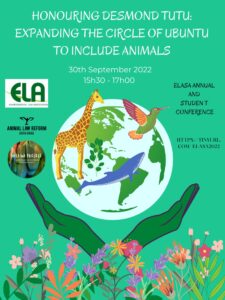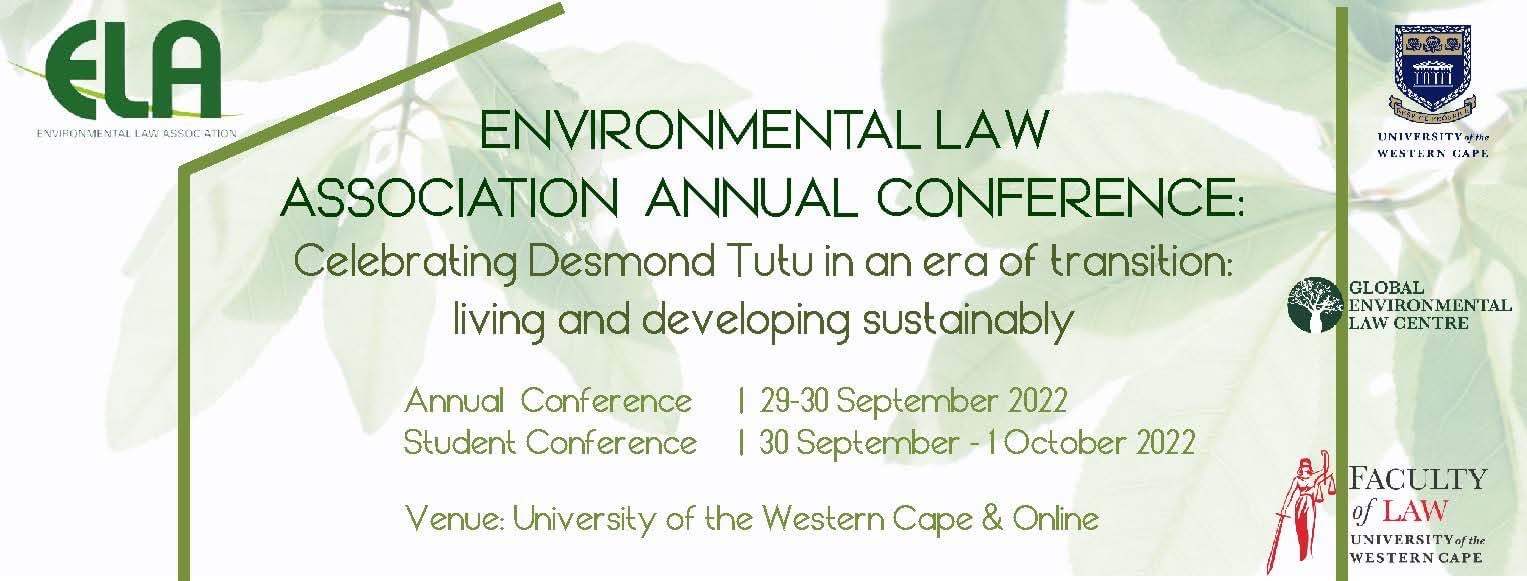Photo credit: Rodger Bosch, Mail&Guardian
Our 2022 hybrid conferences celebrating the life and legacy of Archbishop Desmond Tutu took place on:
29 to 30 Sept – Annual Conference
30 Sept to 1 Oct – Student Conference
The programme is available here.
The conferences sought to honor the late Archbishop Emeritus Desmond Tutu, considered by many as South Africa’s moral compass, who died on 26 December 2021, aged 90. We remember him, among other things, for his contribution to environmental awareness.
In honor of Desmond Tutu, our keynote speaker, Cormac Cullinan, opened the conference with the challenge that “environmental law is not going to stop ecological degradation”. Cormac is a practicing environmental attorney, a director of Cullinan & Associates Inc, and director of the Wild Law Institute, a non-profit organization that advocates for Rights of Nature. He famously authored Wild Law: A Manifesto for Earth Justice, as well as several works commissioned and published by the Food and Agriculture Organization of the United Nations.

Cormac Cullinan
Cormac urged us to reflect on the warning of UN Secretary-General António Guterres, 4 April 2022, that humanity is facing a “climate emergency”, and the reality that existing governance approaches have failed the planet. Acknowledging the need for transformative change, Cormac argued that law and governance should pursue “harmonious co-existence with Nature”. He reminded us of the words of Desmond Tutu in 2010:
Successfully addressing climate change and healing the damage which industrial civilisations have done to Earth will require more than new technologies and market mechanisms. It will require a fundamental transformation of our relationships with Nature.
We are not the masters of Earth, entitled to dominate and exploit her ‘natural resources’ for our own selfish ends, but privileged participants in a wondrous and sacred community of life. Bringing about this transformation and creating viable human communities that live harmoniously within the Earth community will require committed and concerted action. The Universal Declaration of the Rights of Mother Earth calls upon each of us to embrace our kinship with all the beings of the Earth community and to recognise respect and defend the rights of all. Now is the time to answer that call.
Conference sessions addressed transformative environmental constitutionalism, public participation, energy, social justice, mining and climate change, protected areas and the political economy of water, and more. One of the highlights of the conference was an insightful panel discussion on the National Environmental Management Laws Amendment Act, 2022, featuring Amanda van Reenen (Department of Forestry, Fisheries and Environment), and Anique Rossouw and Paul Hardcastle (Department of Environmental Affairs and Development Planning, Western Cape). In addition, the Global Environmental Law Centre at the University of the Western Cape had its launch, led by the Acting Director, Angela van der Berg, who launched a book she has co-edited with Jonathan Verschuuren, Urban Climate Resilience: The Role of Law. The closing panel of the conference involved heated debate amongst practitioners and scholars on the #deadlyair litigation, with presentations by ELA Chair, Peter Kantor, ELA Vice Chair, Prof. Melanie Murcott, ELA Exco member, Dr John Rantlo, and two previous ELA Exco members, Prof. Anél Du Plessis, and Prof. Michael Kidd.
The Student conference opened with an exciting panel led by Prof. Melanie Murcott and Amy P. Wilson on their forthcoming edited volume, Animal Law and Welfare in South Africa. Details of the presentations by several contributors to the the book are available here.

The students’ sessions addressed the concept of Ubuntu in environmental law, climate change and energy, mining and land tenure, vector borne diseases, farming and animal welfare, and pollution, waste, and urban drought.
Best presenters were selected during the conference, based on expert evaluation of the content and form of the students’ presentations.
In the established researcher category, Samantha Cohen was awarded first prize. Samantha was awarded her LLM at Wits, and presented on “How food loss and waste contribute to the exacerbation of change and how the law can minimize those effects”. The runner up in the established researcher category was Meeschka Diedericks, an LLM student at CLES, NWU. Meeschka presented on “Lessons learnt for the future of environmental law: legislative responses to the risk of communicable and vector-borne disease outbreaks”.

Samantha Cohen

Meeschka Diedericks
In the early stage researcher category, the best presenter was Celine Doak, an LLM student at the Global Environmental Law Centre, UWC, who presented on her research topic: “Commercial Ostrich Farming: A Critical Analysis of South Africa’s Flightless Animal Welfare Legislation”. The runner up in this category was Cassius Latlhlang, an LLM student at CLES, NWU, who presented on “The Adequacy of the Botswana Land Tenure System in Controlling Rapid Urbanization”.

Celine Doak

Cassius Latlhang
The presenters received book prizes sponsored by Juta.
In addition, the winners of the ELA Student Essay Competition, 2021/2022 were announced at the conclusion of the Student Conference.
The essays submitted were judged anonymously by a panel of four independent, impartial, expert judges, who scored the essays on against the same rubric.
Two LLM students were awarded prizes. No prize was awarded in the undergraduate category.
The first prize (a sum of R3000 cash plus a book prize sponsored by Juta) was awarded to Nicola Irving, who has now won first prize two years in a row! Nicola is a candidate attorney at Norton Rose Fulbright, working in the Social Impact Department. In this role, she works on public interest litigation and pro bono projects, including environmental and animal rights matters. She earned both her BA Law and LLB degrees with distinction from the University of Pretoria and recently completed her LLM under the supervision of Professor Melanie Murcott, exploring the transformative potential of climate litigation in South Africa. In her spare time, Nicola enjoys tending to her impressive collection of house plants and reading books.
In her essay,”A new ecological reality: The emergence of ecocide as an international crime against peace”, Nicola assesses the emergence of ecocide as an international crime against peace, as part of continuous efforts by jurists aimed at strengthening environmental protection through international criminal law. Against the rapidly deteriorating state of the Earth system within the Anthropocene, she contemplates the responsiveness of international environmental law to prevailing environmental challenges and instability. By reflecting on the fundamental characteristics of the core crimes under the Rome Statute, the essay assesses whether the crime of ecocide is suitable for inclusion within the International Criminal Court’s jurisdiction, as well as what the practical utility of this inclusion would be. Thereafter, the essay explores two different options for international legal reform: first, substantive amendments to provisions of the Rome Statute; and secondly, a ‘green’ interpretation of the existing crimes under the Rome Statute. This essay aims to illustrate that the absence of an international environmental crime – aimed at punishing widescale environmental damage that begets harm to both human populations and ecosystems – has enabled routine environmental degradation. Moreover, this essay is anchored in an Earth system approach, with the ultimate view of reconstructing international environmental law for the Anthropocene.

Nicola Irving
The second prize was awarded to Celine Oates, an Environmental Law Masters student at UCT looking to practice in this field when she finishes her LLM at the end of 2023. Celine has a deep passion for the way in which humans relate to the natural world, and all the wonderful creatures within it. She hopes to be a part of bettering this relationship through legal intervention, education, and interaction with communities across South Africa.
In her essay, “Enhancing environmental protection through the marriage of ecospirituality and the law”, Celine discusses how an era of so-called enlightenment seemingly alienated many humans from their natural environment which saw society dive into a Western model of relation to one’s environment, with nature reduced to commodities for human exploitation. In the process, indigenous knowledge of the spiritual interconnectedness to one’s environment, and the management of one’s environment informed by this knowledge, was seemingly lost to those who subscribed to a Western way of life. However, amongst those alienated from the environment, there is presently evidence of a shift from an anthropocentric paradigm to a more ecocentric paradigm in environmental management. Particularly, within this newer ecocentric paradigm, there is increasing evidence of an ecospiritual perspective through which indigenous knowledge and practices have stepped up to the forefront in matters concerning environmental protection. Ecospirituality offers itself as an alternative form of environmental protection as opposed to Western philosophies that pervade current laws concerning the environment, and when placed alongside the traditional scientific arguments against environmental degradation it makes for a robust framework of environmental protection. The paper investigates the way in which ecospirituality has interacted with the law so as to enhance environmental protection, and the outcomes as well as cautions associated with this interaction.

Celine Oates
We thank Juta for their generous sponsorship of our student conference!

Check out the conference programme below:
ELA Annual and Student Conference Draft Programmes 2022 rev_10



